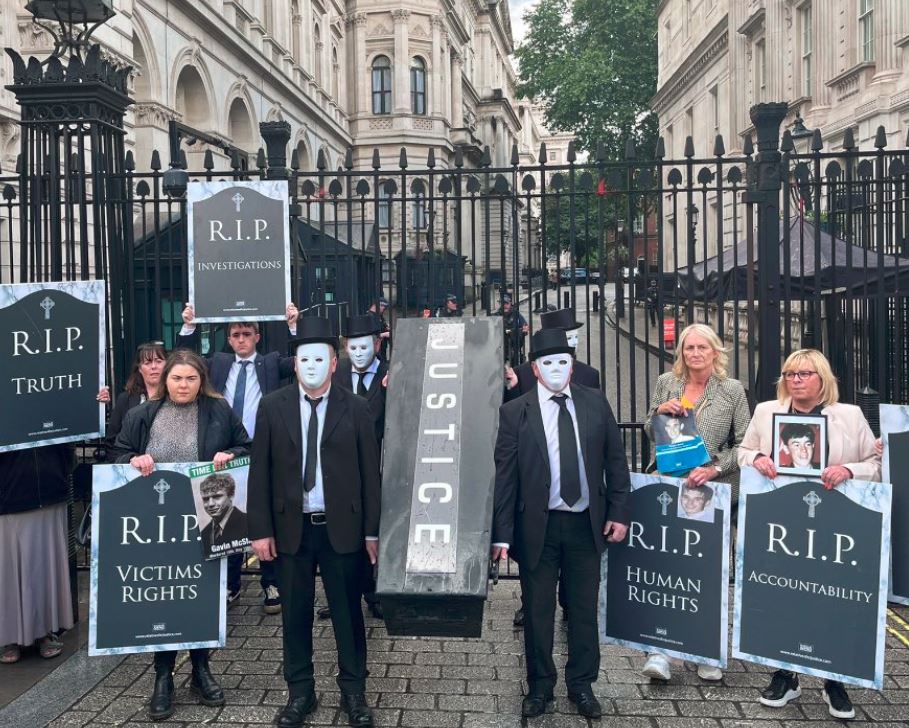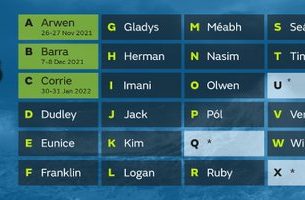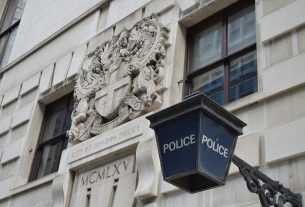Conservative MPs have voted for a controversial Northern Ireland legacy bill despite staunch opposition from all Northern Ireland political parties.
Protests against the bill were held in Belfast, Derry and London with families of victims of the Troubles telling the UK prime minister the government’s proposed legislation is “an affront to all modern standards of decency”. Victims’ campaigners said the UK government is trying to pass the bill to evade scrutiny for what the state has done in Northern Ireland and to provide an amnesty for killings carried out by British soldiers.
The Northern Ireland Troubles (Legacy and Reconciliation) Bill will provide immunity from prosecution to those deemed to have cooperated with a new Independent Commission for Reconciliation and Information Recovery (ICRIR). It will also stop any future inquests and civil actions related to the murders, bombings and all other atrocities of the Troubles, defined as the period from January 1, 1966 to April 10, 1998. Criminal prosecutions could still take place.
The legacy bill was voted through the Commons today (May 24) by 285 votes to 208 to give it a second reading, meaning the principle of the legislation has been approved. However, it only received the backing of Conservative MPs with all Northern Ireland MPs – from the unionist DUP, nationalist SDLP and cross-community Alliance parties voting against it, along with MPs from other British parties.
Legacy bill will deny ‘truth, justice and accountability’
Northern Ireland secretary Brandon Lewis told the Commons that successive British governments have been unable to resolve the legacy of the Troubles due to its complexity and sensitivity, arguing that the “current system is broken. It is delivering neither justice nor information to the vast majority of families.
“Faith in the criminal justice model to deal with legacy cases has been undermined. We need to be honest about the limitations of focusing on criminal justice as a means to secure truth and accountability”.
SDLP leader Colum Eastwood, the MP for Foyle, said: “The pretence from this government that this is about victims or reconciliation is frankly an out-and-out lie.”
If passed, the legacy bill will “deny all families who had loved ones killed truth, justice and accountability, irrelevant of who the perpetrators were,” said Mark Kelly, whose 12-year-old sister Carol Ann was killed by the British Army 41 years ago. “It will close down investigations, inquests, police ombudsman inquiries and civil cases”.
‘Perpetrator centred’ and ‘anti victim’
Members of Relatives for Justice carried a coffin from Westminster Palace to Downing Street and said the legacy bill is “perpetrator centred” and “anti victim”.
The group delivered a letter to Number 10 outlining its opposition to the bill. Its chief executive, Mark Thompson said Boris Johnson “needs to listen” to victims’ relatives. The bill is about the UK government “putting a blanket ban on any examination of what they’ve been involved in”, said Thompson, adding: “This process the UK proposes will not provide a modicum of truth for anyone.”
In the Commons, DUP MP for Belfast East Gavin Robinson said: “I know there are members in this chamber that think ‘for goodness sake Northern Ireland legacy, can’t they just agree?’
“Well, we all do agree in Northern Ireland that this bill is wrong, that this bill will not command support, that this bill drives a coach and horses through the pursuit of justice. And I take no pride in that.”
Conservative MP and former Northern Ireland secretary Julian Smith, said: “Today many victims feel that they have been hit by a double whammy with this bill. Their route to justice cut off, and at the same time their route to the truth restricted.”




